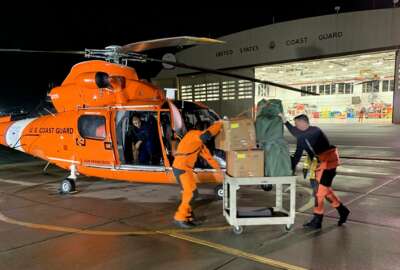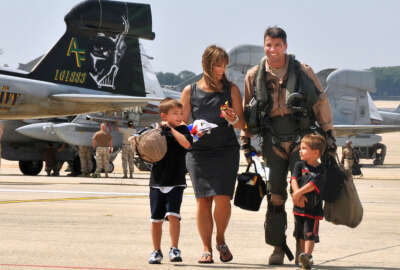 First Look
First Look Industry execs set sail with Coast Guard for ‘academy’
Forty industry executives recently embedded themselves into the Coast Guard for a year. The project is called the Coast Guard Industry Academy.
Best listening experience is on Chrome, Firefox or Safari. Subscribe to Federal Drive’s daily audio interviews on Apple Podcasts or PodcastOne.
Forty industry executives recently embedded themselves into the Coast Guard for a year. The project is called the Coast Guard Industry Academy, and this year’s is the second time around. It’s organized by a group called the Washington Homeland Security Roundtable. Roundtable Director Kay Olive joined Federal Drive with Tom Temin in studio with the why’s and wherefore’s of the program.
Interview transcript:
Tom Temin: Ms. Olive, good to have you in.
Kay Olive: Good morning. It’s delightful to be here.
Tom Temin: Tell us about the roundtable, first of all, the umbrella organization for all of this.
Kay Olive: Certainly, Tom. The roundtable was started at the request of a couple of seniors at DHS after the inception, to help find a group to link industry and DHS and help industry better understand what was going on at DHS with all the combinations of agencies and the new folks there, and how could we better understand the mission, be better partners, be better advocates.
Tom Temin: So it’s not really a trade group, exactly. It’s more people that volunteer to be able to advise DHS.
Kay Olive: It’s kind of a combination of both. We do a monthly meeting and bring in some seniors from DHS to talk about particular mission sets. It’s more of an educational focus, but then also, that allows the industry execs to come back and be a better partner as well as a better advocate.
Tom Temin: And how many members do you have? How many member companies?
Kay Olive: It varies, typically we are in the high twenties.
Tom Temin: So it’s not a gigantic broad –
Kay Olive: No, deliberately not.
Tom Temin: All right, and tell us about the Coast Guard Industry Academy. It caught our eye because the commandant, Adm. Karl Schultz, was actually a part of the opening of this year’s class.
Kay Olive: Yes, and actually, this is the second time we’re doing it. As you mentioned, the goal of the Coast Guard Industry Academy is to take a select group of industry executives at senior levels, embed them in a variety of programs across the Coast Guard so that they actually learn what the mission is – hands-on. They allow us to view a lot of training exercises and participate in a lot of different areas. This year we’ll start out at headquarters. We visit the Coast Guard Shipyard in Baltimore. We go to … Cape May, [New Jersey], which is their training center. We’ll go to a variety of other locations as well.
Tom Temin: And so the people actually step aboard Coast Guard vessels, too, it looks like.
Kay Olive: And airplanes and helicopters, absolutely.
Tom Temin: And the people that participate from industry these are not the business development people or the junior marketing type folks, is it?
Kay Olive: No, you’ll have some business development folks but it’s typically more the executives that run that area, will have a lot of program management folks, will have engineers, will have scientists, senior executives. It’s a pretty broad group of participants.
Tom Temin: And how much time do they spend over the course of the year in total, with the Coast Guard?
Kay Olive: Often on, we’ll spend three days in the first session, three or four days the second session, a week the third one and then about another four days to close out the program.
Tom Temin: And is it mostly the Coast Guard talking to the industry or the other way around?
Kay Olive: During the day and during the actual program the Coast Guard is presenting missions or involving us in training exercises or providing demos on things for inland waterways, reports of entry or Gulf Coast operations, that type of thing. What we do find is that we we tend to build a tremendous level of relationships and a lot of the conversations over breakfast or lunch or dinner with the Coast Guard officers and the industry execs will be a great deal of sharing. So it tends to go both ways. But the actual program itself is the Coast Guard involving us.
Tom Temin: And what about the rank and file “coasties” that might be aboard? Do they get to talk to industry also?
Kay Olive: Oh, absolutely. During the first program we actually took went out to sea for two days on the Eagle, the tall ship of the Coast Guard. And so we mixed with the staff and were able to, you know, help with ropes and pulleys. And —
Tom Temin: It’s a sailing vessel.
Kay Olive: Yes, it’s a sailing vessel, so it was a tremendous opportunity, and we will work with all levels of the Coast Guard in every program.
Tom Temin: We’re speaking with Kay Olive. She’s director of the Washington Homeland Security Roundtable. And the first time is three days. So there’s evenings, then spent also, so it’s really a way to kind of get in deeply – psyche, almost, of the Coast Guard, sounds like.
Kay Olive: Yes, yes, and actually build relationships and people you can go back to later with questions. As industries working various programs with the Coast Guard, it is very helpful to have one you can reach back to and say, “What about this? Help me understand such and such. Help me know where to go for this,” whether it’s an IT issue, it’s an equipment issue. And so it helps build those relationships. But it also — the long term goal is it built a tremendous appreciation for the Coast Guard of the United States, which is really, truly the preeminent Coast Guard in the world.
Tom Temin: Now, from a procurement standpoint, if you look at the Coast Guard, they buy across the board everything from, as you mentioned, shipbuilding contracts to supply contracts and oil and additive manufacturing, to maybe make a new divot or something, or davit, I guess, would be the right term on board and give us a sense of the types of companies that are participating, in terms of what they supply.
Kay Olive: Absolutely. We will have IT companies, we have barge companies. We have companies that work with them in the ports. We have shipbuilders. We have airplane companies, we have just a tremendous variety of folks across the gamut of what the Coast Guard mission sets include.
Tom Temin: Now what happens if there is a pending acquisition that’s under source selection study at that point? I mean you really can’t have those discussions if you’re part of the source, if you’re one of the bidders. Is there some mechanism to make sure that those discussions don’t come up?
Kay Olive: We do not discuss procurements at all, ever. That’s one of the caveats of the program to protect the Coast Guard, but it also protects the industry execs as well, because the last thing they want is to be disqualified from something. So we do not discuss that. And if there’s something that they’re going through currently, again the industry execs, we as the roundtable make it very clear to them that these are not procurement discussions. These are mission discussions, these are understanding educational sessions, not procurement related at all.
Tom Temin: And do you have plans to extend this to other parts of Homeland Security like [Customs and Border Protection] might be interesting to travel with a little bit, a little scarier, perhaps in some situations or FEMA, even [the Transportation Security Administration]. Maybe you could help them rifle through some luggage?
Kay Olive: That’s right. That’s true. We actually, the first program we ever did was the Border Patrol Industry Academy. We did that in 2015. It was a very successful program, and we did the same type of format a few days at headquarters and then travels around the country, concluded with a week in training uniform at the Border Patrol Training Academy, in Artesia, New Mexico, in the dead of summer. So you can imagine how exciting and fun that was
Tom Temin: Yeah, for some of those out-of-shape executives. They might have lost a little weight, there, getting out there in the hot desert.
Kay Olive: It was It was a great experience. We are hopeful of doing that again sometime soon. The border patrols had a little bit going on the last couple of years. We have done shorter types of programs with TSA and are looking at a variety of other ideas right now.
Tom Temin: And so being in the Homeland Security … when you mention roundtable, does that mean Homeland Security as it apartment or all of the enterprises that might be outside of the department that are part of the Homeland Security enterprise, with a small H and a small S?
Kay Olive: Tom, we would not exclude anything. We’ve done programs from time to time with Homeland Defense as part of [the Defense Department]. But our focus is primarily D.HS. It’s such a huge agency and has such a broad scope and depth of mission that it really is a great deal to cover.
Tom Temin: Kay Olive is director of the Washington Homeland Security Roundtable. Thanks so much for joining me.
Kay Olive: Thank you
Tom Temin: We’ll post this interview along with a link to more information at www.federalnewsnetwork.com/FederalDrive. Hear the Federal Drive on demand and on your device. Subscribe at Apple Podcasts or Podcastone.
Copyright © 2024 Federal News Network. All rights reserved. This website is not intended for users located within the European Economic Area.





